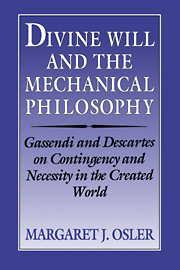 Divine Will and the Mechanical Philosophy
Divine Will and the Mechanical Philosophy Book contents
- Frontmatter
- Contents
- Acknowledgments
- Introduction
- Part I Theology and the philosophy of nature
- 1 Divine power and divine will in the Middle Ages: Historical and conceptual background
- 2 Baptizing Epicurean philosophy: Gassendi on divine will and the philosophy of nature
- 3 Providence and human freedom in Christian Epicureanism: Gassendi on fortune, fate, and divination
- 4 Theology, metaphysics, and epistemology: Gassendi's “science of appearances”
- 5 Eternal truths and the laws of nature: The theological foundations of Descartes' philosophy of nature
- 6 Gassendi and Descartes in conflict
- Part II The mechanical philosophy and the formation of scientific styles
- Bibliography
- Index
4 - Theology, metaphysics, and epistemology: Gassendi's “science of appearances”
Published online by Cambridge University Press: 11 September 2009
- Frontmatter
- Contents
- Acknowledgments
- Introduction
- Part I Theology and the philosophy of nature
- 1 Divine power and divine will in the Middle Ages: Historical and conceptual background
- 2 Baptizing Epicurean philosophy: Gassendi on divine will and the philosophy of nature
- 3 Providence and human freedom in Christian Epicureanism: Gassendi on fortune, fate, and divination
- 4 Theology, metaphysics, and epistemology: Gassendi's “science of appearances”
- 5 Eternal truths and the laws of nature: The theological foundations of Descartes' philosophy of nature
- 6 Gassendi and Descartes in conflict
- Part II The mechanical philosophy and the formation of scientific styles
- Bibliography
- Index
Summary
Nothing would be more beautiful or more desirable for us than to know fully the things that nature has kept in her depths or her farthest recesses; but although we may wish for that, we are being just as absurd as when we yearn to fly like the birds or to stay young forever.
Pierre Gassendi, Syntagma philosophicumDespite the fact that Gassendi's thought developed in a variety of ways during his lifetime, his fundamental principles – a voluntarist theology, an empiricist epistemology, a nominalist or conceptualist account of universals, and an anti-essentialist metaphysics – remained constant throughout his writings. In making this statement, I disagree with Bloch's contention that Gassendi's philosophy does not constitute a system. Bloch regards the Syntagma philosophicum as “an assemblage of historical, scientific, and philosophical discussion.” He also denies that theology played any important role in Gassendi's thought, claiming instead that it was introduced only after 1641 to dissimulate the materialism of which Gassendi was growing increasingly aware. As I have argued in Chapters 2 and 3, whatever Gassendi's state of belief, the theological views upon which he drew are voluntarist and are reflected – directly and indirectly – throughout his work. Despite changes in his reactions to skepticism, despite his growing interest in natural philosophy, and despite his increasing focus on his Epicurean project, the same theological and philosophical views remained central to his thinking from the early Exercitationes paradoxicœ adversus Aristoteleos (1624) to the posthumously published Syntagma philosophicum (1658).
- Type
- Chapter
- Information
- Divine Will and the Mechanical PhilosophyGassendi and Descartes on Contingency and Necessity in the Created World, pp. 102 - 117Publisher: Cambridge University PressPrint publication year: 1994


